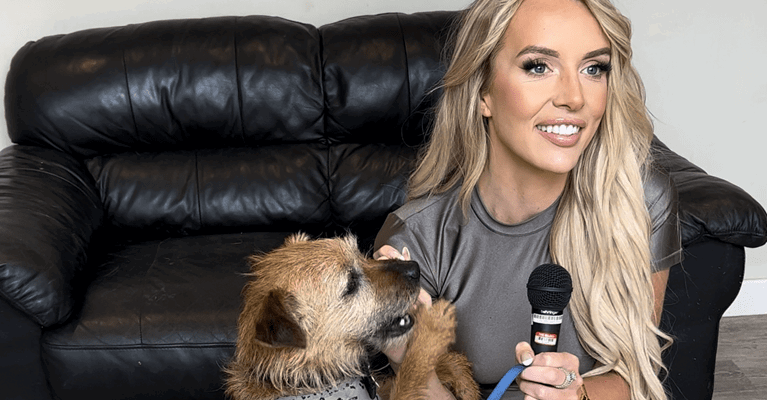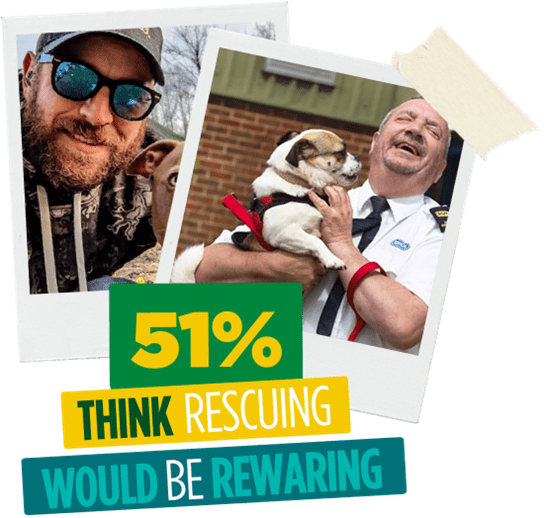Everything you need to know about adopting a rescue dog or cat
Britain is undoubtedly a nation of pet lovers, and when you finally find yourself in the position to get a furry friend, it can be an exciting time for everyone involved. However, instead of buying a puppy or kitten from a breeder, have you ever considered adopting a rescue pet?

48% of brits are looking to add a new pet to their family.....
Through no fault of their own, cats, dogs, and even rabbits or guinea pigs can all end up in rescue centres, and despite the hard work and dedication of the charities, there is only so much space to house abandoned or surrendered pets. By adopting a rescue animal, you are giving them a second chance at a safe and loving home, where they can learn to be happy and healthy again. In return, they will provide companionship, bags of love, a smile on your face, and can transform your home for the better.
With so many benefits of rehoming a rescue dog, cat or other animal, we conducted new research to discover the nation’s opinions on adopting a rescue dog or cat and what might be holding them back.
Our survey of 2,000 Brits revealed that almost half (48 per cent) are looking to add a new furry member to their family, with over two-thirds (69 per cent) favouring rescuing an abandoned animal over a young pup or kitten from a breeder. When asked why, 51 per cent said they think that rescuing an animal would be a rewarding experience.


Every animal has a story to tell!
The study also revealed that 41 per cent of Brits think adopting is kinder than getting a puppy or kitten from a breeder, while a quarter (24 per cent) have simply been put off by the skyrocketing prices charged by breeders.
However, almost all Brits (92 per cent) agree that rescue pets have unique needs to those from breeders, saying they need more time to get to know and trust you (71 per cent), more love and affection (60 per cent) and additional health checks (43 per cent). One in ten (12 per cent) expect rescue dogs specifically to need a lot more time and care.
Research is important when it comes to considering the adoption of a pet, as many factors such as costs, time commitment, and lifestyle adjustments need to be considered. In fact, on average, Brits spend a whopping six hours researching before adopting a dog or cat to find out what care might be required.
Over half of all pet owners say they have improved their mental health
The addition of a cat or dog to your home can bring so much joy and 60 per cent of Brits believe having a cat or dog is good for your mental health. Over half (53 per cent) agree they provide emotional support, and over three-quarters (78 per cent) admit they always put a smile on their face.
In light of this research, we’ve spoken to our local RSPCA branch, the RSPCA Leeds & Wakefield, to understand more about companion care and their animal experts have provided helpful guidance on the unique needs of a rescued animal.
Animal expert and RSPCA Leeds & Wakefield Animal Care Manager, Megan Rattray, says: “Different animal charities take in many types of animals who have undergone unique experiences in life, and at the RSPCA Leeds & Wakefield, we rescue animals who have sometimes suffered abuse or neglect and require more emotional and mental support. To help our adopters, we offer plenty of post-adoption advice and support to help them settle in as a family.
Katie Walley, Senior Director for Asda Money and Mobile, adds: “We enjoyed learning from our local RSPCA Leeds & Wakefield branch about the various needs of rescued animals. No one knows the rescue animals better than their team and by adopting from animal charities, you get lots of support throughout the whole adoption process.
“Introducing any pet into your life can be nerve-wracking as well as exciting, but pet insurance can provide much-needed reassurance and support should any unexpected veterinary bills or additional pet needs come your way. We offer many levels of cover to suit a variety of budgeting needs so that pet insurance can be accessible for all our customers.”
We recently visited the RSPCA Leeds & Wakefield branch to meet the animals and understand first-hand how loving and rewarding the experience of adopting a pet can be.
Animal expert and RSPCA Leeds & Wakefield Animal Care Manager, Megan Rattray, has provided some top tips and a handy guide to rescuing a new pet, urging potential adopters to have a clear idea of what they’re looking for and what type of pet they can give the best possible home to.
What to consider before adopting a rescue dog or cat
- Try to be practical and logical.
-
Make sure you have a clear idea of what you’re looking for and what you can offer a new pet. Ask yourself:
- What is it that you need from an animal?
- What can you provide them to make it a successful adoption?
- Do you have a garden or a balcony for them to have outdoor space?
- Do you live in a rural area or a town centre?
- Don’t set your sights on one certain breed.
-
Once you’re at the rescue centre you may find that another breed will suit your lifestyle better.
- Research different rescues and charities.
-
The RSPCA often take animals who have suffered abuse, neglect or poor care, so these animals will require more emotional and mental support. Many charities also take in animals where the owner has had to make a difficult decision to give the animal away due to their own personal circumstances.
- Be open and honest with the rescue centre.
-
When they ask you questions, try to answer as honestly and as fully as possible, so that they can help you find your perfect match. Trust the advice and judgement of the rehoming staff when it comes to choosing an ideal pet.
- Try pet sitting.
-
If you are unsure about whether you can really integrate a pet properly into your lifestyle, try pet sitting for a friend or family member to gain more understanding of what commitment is needed from a pet.
- Work out if you can financially afford owning a pet.
-
There are lots of things to consider when adopting and knowing the costs is crucial. Be sure to research the breed before adoption to know more about their common illnesses or injuries and look into pet insurance for rescue pets, to find out what you could be covered for.
- Make sure you have everything you need.
-
This includes things such as bowls, blankets, beds, food, travel equipment etc. You should also ensure your home has a safe space that your pet can call theirs, preferably a quiet area that is out of the way and not frequently walked past.
- Persevere to find the right pet for you.
-
If you have not been successful with your first choice, then keep looking! There are many loving dogs and cats out there looking for a new home, sometimes it can take a little patience to find the one that is right for you.
Tips on how to look after a rescue dog or cat
To ensure you have the right knowledge on how to look after your rescue pet and introduce them to your home, Megan has some handy tips on how to help your furry friend settle in well. Tips on how to look after your newly adopted rescue pet include:

- Have zero expectations. When you take your new family member home, each animal is unique and will adjust differently. It will also likely be a different experience to your last pet.
- Patience is key! Allow your pet to scope out their new home, explore, and come to you in their own time.
- Think of the 3-3-3 rule: Three days to decompress, three weeks to learn your routine, and three months to feel at home.
- Consider pet insurance: This can help enormously towards unexpected vet bills for all pets, but especially senior pets and those with medical conditions (these are the highest-ranking animals that come into rescue).
- Make sure they get plenty of physical exercise and mental stimulation: They’ll be healthier, and happier, and you’ll build that bond with them and earn their trust.
- Don’t rush experiences. Take everything at your new pets’ pace and give them time to enjoy meeting new people in a gradual and controlled way, rather than meeting lots of friends and family within the first 24 hours.
- Use the same vet. Senior pets and those with medical conditions are often the highest-ranking animals to come into rescue. Charities will work with vets to find the root cause of the medical condition and work to get the most suitable treatment. Speak to the rescue and ask if you can use the same vet, as the animal will already know and trust their existing vet.
- Don’t be afraid to ask for help: If you feel you are struggling at any point, speak to the charity you adopted the animal from. They are here to help and want to make every adoption a successful one.
- Enjoy your new family member, they will bring you lots of happiness!
Debunking common pet adoption myths
When looking to adopt a rescue dog or cat you may have questions and concerns about whether this option is right for you and whether you can provide what a rescue animal needs. However, despite some common misconceptions, it is worth noting that every case is unique and what doesn’t work for one animal may be perfect for another.
Some common misconceptions people have about adopting a rescue dog and cat are:
-
![]()
If you already have multiple pets, you can’t adopt another.
Every case is different, some rescue pets may prefer to be the only pet in the household, whereas others enjoy more company. It really does depend on the animal, the home and the individual situation and can also depend on whether the owner can manage all pets in a way that they can all remain happy and stress-free.
-
![Car icon]()
I can’t adopt a cat because I live near a main road.
This can depend on the cat. If someone lives on a main road or in a built-up area, they may not be suited to a cat that likes to roam far and explore. However, if they were to adopt a cat who prefers to stay indoors or who is not likely to venture far from the garden, it could be a perfect match.
-
![]()
I can’t adopt because I work full time.
It is advised that young pets and dogs should not be left for more than four hours at a time. However, those who work full-time can still take advantage of dog walkers and pet sitters.
-
![]()
My garden must have 6ft fences for me to adopt a dog.
This is not the case for all dogs. Most dogs don’t leap over fences and simply require a normal secure boundary to keep them safe. However, if the dog is very large and has shown they like to jump, then a high fence will be a good idea. It is also important to be able to supervise the dog when loose in the garden.
-
![]()
I want to adopt but I live in a flat or a house without a garden.
This depends on whether the potential owner is able and willing to take their pet outside regularly throughout the day. You should also discuss this with the team at the rescue shelter to get their opinion as it can also depend on the suitability of the rescue dog or cat and the environment they require.
-
![]()
I’m over the age of 75.
There are many cases where animals can be suited very well to more senior adopters. Everyone's unique circumstances, abilities, and support network will be considered to gauge their suitability. Rescue centres often have older animals in our care who could be a perfect match for a senior adopter!
-
![Teddy bear icon]()
We have a child under the age of 5.
This is dependent on the individual case and the animal’s known history. Many rescue dogs and cats have previously been socialised with children and may be fine to be rehomed with young and excitable children, whereas more nervous and less socialised animals may benefit from an older or calmer child.
-
![]()
I want to adopt a rabbit as they don’t require much space.
Although rabbits are small, they still require a large area to be able to roam, jump and play. If a hutch or run set-up doesn’t suit you, lots of adopters have repurposed their shed or rooms to be a great bunny-proofed play and sleep area. You can also ask the team at the rescue shelters for ideas.
Previous adopter testimonials
-

Tiger
10 years old, Tabby catTiger was adopted by Jan: “Tiger is a 10-year-old neutered male tabby, who had to have a 2-month stay with RSPCA Leeds and Wakefield when his previous owners could no longer look after him. I applied to adopt him and 2 days later I was invited to meet him. All the staff and volunteers are lovely to deal with, make the process really easy and you can tell they care passionately about what they do. Tiger has settled in really well and quickly made himself totally at home. We love him to bits, and I’d urge anyone in a position to give an animal a good home, to do so as it’s so rewarding.”
-

Benji
9 years old, Terrier CrossBenji was adopted by couple Andrew and Kathryn: “Benji has made the house a home again. He was a little anxious when he first arrived but immediately took to the house and his garden. We had some help from the RSPCA Leeds & Wakefield to help us manage his anxieties which were mainly around being handled and of men. He is his own boss with a nice personality. We love him.”
-

Sadie
2 years old, Cane Corso (Italian Mastiff)Sadie was adopted by Sally: “I live in Northumberland and made quite a few trips to Leeds to get acquainted with Sadie over a period of about two months. She is a very big (44 kg!) 2-year-old girl who loves nothing more than chasing a football, getting out for a walk and sleeping on my bed. She is gaining in confidence daily and I couldn't imagine life without her! Special thanks to Megan and Lucy at the RSPCA Leeds & Wakefield who guided Sadie and I through the adoption process with excellent advice and patience.”
-

Potus
7 years old, Domestic short hair catPotus is a blind cat who was adopted by Jon: “Taking on a cat, let alone a blind cat, can feel quite daunting but we found the whole experience much easier than we thought we would. RSPCA Leeds & Wakefield really helped us with useful information and tips before we took Potus home and when we brought him home, he just settled in perfectly. It took him a few days to get acclimated to the new setting, but he got to know where things were and now runs freely around the house. He has truly brought us so much joy and seeing him thrive in our home is such a heart-warming and joyful experience every day.”
Find more information about Asda Money’s pet insurance options here, or feel free to contact us and one of our agents will be happy to help.
*Asda Money Pet Insurance is not in partnership with RSPCA Leeds & Wakefield
Asda Pet Insurance is arranged and administered by Insurance Factory Limited. Insurance Factory Limited is authorised and regulated by the Financial Conduct Authority. (No. 306164). Registered in England and Wales Number 02982445. Registered Office: Markerstudy House, 45 Westerham Road, Bessels Green, Sevenoaks, Kent, TN13 2QB. You can check this by visiting the Financial Services Register at https://www.fca.org.uk/register







